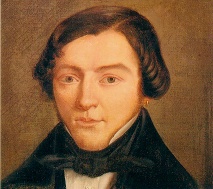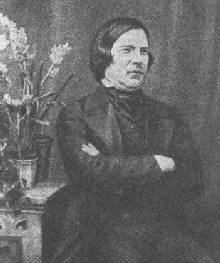
 (born
Zwickau, 8 June 1810; died Endenich, 29 July 1856).
(born
Zwickau, 8 June 1810; died Endenich, 29 July 1856).
The son of a bookseller, he early showed ability as a pianist and an interest in composing as well as literary leanings. He was also enthusiastic over the writings of 'Jean Paul' (J.P.F. Richter), girl friends and drinking champagne, tastes he retained. In 1821 he went to Leipzig to study law but instead spent his time in musical, social and literary activities. He wrote some piano music and took lessons from Friedrich Wieck. After a spell in Heidelberg, ostensibly studying law but actually music, he persuaded his family that he should give up law in favour of a pianist's career, and in 1830 he went to live with Wieck at Leipzig. But he soon had trouble with his hands (allegedly due to a machine to strengthen his fingers, but more likely through remedies for a syphilitic sore). Composition, however, continued; several piano works date from this period.
In 1834 Schumann founded a music journal, the "Neue Zeitschrift für Musik"; he was its editor and leading writer for ten years. He was a brilliant and perceptive critic: his writings embody the most progressive aspects of musical thinking in his time, and he drew attention to many promising young composers. He was the first to recognize the genius of Chopin and Brahms, writing enthusiastic critiques of their music.
Sometimes he wrote under pseudonyms, Eusebius (representing his lyrical, contemplative side) and Florestan (his fiery, impetuous one); he used these in his music, too. His compositions at this time were mainly for piano: they include variations on the name of one of his lady friends, Abegg (the musical notes A-B-E-G-G), the character-pieces "Davidsbündlertänze" ('Dances of the league of David', an imaginary association of those fighting the Philistines), "Carnaval" (pieces with literary or other allusive meanings, including one on the notes A-S-C-H after the place another girl friend came from), "Phantasiestücke" (a collection of poetic pieces depicting moods), "Kreisleriana" (fantasy pieces around the character of a mad Kapellmeister) and "Kinderszenen" ('Scenes from Childhood').
Affairs of the heart played a large part in his life. By
1835 he was in love with Wieck's young daughter Clara, but Wieck
did his best to separate them. They pledged themselves in 1837 but were
much apart and Schumann went through deep depressions. In 1839 they took
legal steps to make Wieck's consent unnecessary, and after many further
trials they were able to marry in 1840.
Schumann, understandably, turned in that year to song; he wrote circa 150 songs, including most of his finest, at this time, among them several groups and cycles, the latter including "Frauenliebe und -leben" ('A Woman's Love and Life') and "Dichterliebe" ('A Poet's Love'), which tells (to verse by Heine) a tragic Romantic story of the flowering of love, its failure and poet's exclusion from joy and his longing for death. Schumann, as a pianist composer, made the piano partake fully in the expression of emotion in such songs, often giving it the most telling music when the voice had finished.
In 1841, however, Schumann turned to orchestral music: he wrote symphonies and a beautiful, poetic piece for piano and orchestra for Clara that he later reworked as the first movement of his Piano Concerto. Then in 1842, when Clara was away on a concert tour (he disliked being in her shadow and remained at home), he turned to chamber music, and wrote his three string quartets and three works with piano, of which the Piano Quintet has always been a favourite for the freshness and Romantic warmth of its ideas.
After that, in 1843, he turned to choral music, working at a secular oratorio and at setting part of Goethe's "Faust". He also took up a teaching post at the new conservatory in Leipzig of which Mendelssohn was director. But he was an ineffectual teacher; and he had limited success as a conductor too. He and Clara moved to Dresden in 1844, but his deep depressions continued, hampering his creativity. Not until 1847-8 was he again productive, writing his opera "Genoveva" (given in Leipzig in 1850 with moderate success), chamber music and songs.
In 1850 he took up a post in Düsseldorf as town musical director. He was at first happy and prolific, writing the eloquent Cello Concerto and the Rhenish Symphony (no.3: one movement depicts his impressions in Cologne Cathedral). But the post worked out badly because of his indifferent conducting. In 1852-3 his health and spirits deteriorated and he realized that he could not continue in his post. In 1854 he began to suffer hallucinations; he attempted suicide (he had always dreaded the possibility of madness) and entered an asylum, where he died in 1856, almost certainly of the effects of syphilis, cared for at the end by Clara and the young Brahms.